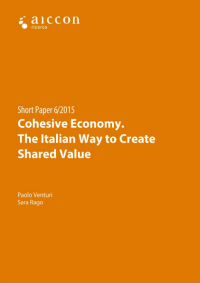Cohesive Economy. The Italian Way to Create Shared Value
The key role played by the firms in building a new kind of welfare is going to become even more relevant, especially as actors able to answer to unmet needs in the social field. This new growing link between enterprises, territories and communities has its roots in several concepts that will be analyzed in the following paragraphs through which we will try to define the framework of this important change.
In order to re-build the necessary equilibrium among the welfare systems, it is fundamental to properly define the concepts of well-being and extended mutuality. Over time, the concept of well-being has progressively come to identify a broader set of notions.
Today creating well-being means acting on people’s quality of life and freedom of choice for their own development and the development of the community they are part of. As stated by Orsi (2009a), “when talking about welfare, there is a widespread consensus among citizens and the public entity on the illusion according to which institutions, services and experts can solve any problem through specific performances, in a purely consumerist logic.
In this situation, the citizen has, on the one hand, hugely increased his expectations towards the welfare system and the institutions in general; on the other hand he now feels he has (and he actually has) a lower level of responsibility and competence about all the relations that have an influence on life’s quality”. Moreover, “the consumerist model, that has involved the welfare system, has produced a relational depletion.
This is particularly referred to non-economic resources as ethics, values, time, experiences, knowledge, communication skills and friendship”.

